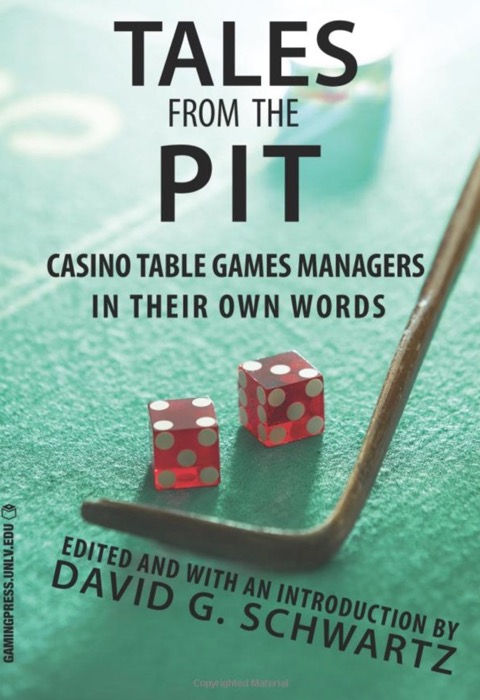
Tales from the Pit, a new publication edited by David G. Schwartz, Director of the Center for Gaming Research, inside UNLV Libraries Special Collections (Cover photo by Aaron Mayes, UNLV Special Collections Curator of Visual Materials)
UNLV Libraries Special Collections houses a vast collection of recorded, transcribed and/or digitized oral histories—first-person narratives told by Las Vegas pioneers and residents, some covering events that happened 100 years or more in the past. They are, in a way, self-portraits of people from many professions, cultures and lifestyles who have shared in Las Vegas’ eclectic history. What was it like to live and work near Hoover Dam during its construction? What was life like for a showgirl during the heyday of the Rat Pack? These stories are endlessly fascinating, even if you’re not a historian or researcher!
In 2015, the Center for Gaming Research received a grant from the UNLV University Libraries Advisory Board funding an oral history project to document the stories of table games managers. The interviews included retired managers as well as others currently working in casinos. These collected accounts make for riveting reading in a new book, edited by David G. Schwartz, Director of the Center for Gaming Research and published by the UNLV Gaming Press. Tales from the Pit gives us unexpectedly compelling insight into the broad personal experiences of those who spent long days and nights on the casino floor.

Author and editor David G. Schwartz, Director of the Center for Gaming Research in UNLV Libraries Special Collections. Tales from the Pit now joins his several other books on the development of casinos and gambling history.
Interviewees for the oral history project described in detail how they began their careers as new dealers, working their way up the ranks from low-paid jobs in downtown casinos to prestigious management positions in high-end Strip resorts. Schwartz explains in his introduction that these oral histories describe a career path in transition, noting that the requirements for dealers and higher-ups are far different today. According to Schwartz, the book “illuminates the past several decades of casino history through the words of those who lived and made it.” He adds, “There are few documentary sources that describe the everyday operations of casinos and the work conditions in them as these interviewees do…(They) are privy to insights into the nature of the casino industry that might elude line employees or executives who have not spent significant time in operations.”
Chapters within Tales from the Pit are arranged by topic, further subdivided by the responses of individual narrators to interview questions. A chapter on “Memorable Players” also contains some memorable quotes:
“Those days [early ‘60s], four hundred dollars would be a big (hand)—that’d be equal to ten thousand today…You gotta realize, the Sinatra show only cost $6.95 to have dinner and see the show. So, it’s another world.”
Ed Walters
On high-rollers: “They want airfare, they want a discount on their loss, they want rooms, they want gift shop, but not just your average gift shop. They want watches, they want jewelry, they want top-floor suites…One of our players—I remember he wanted a stereo to play his iPod, so we had to run across the street to Best Buy and purchase one.”
Christina Gentile
“…the guy had been playing a lot, come up from Arizona every weekend and would win…Well, he had been embezzling money from a company on Friday, and then putting it back in the safe on Monday, ‘cause he was always up. So the first time he was stuck, he had no way, so he killed himself, actually on the way back.”
Dave Torres
Other chapters discuss breaking into the profession—with advice for those just starting out—methods of cheating and dealing with cheaters, what makes a manager bad or good, and differences in casino operations around the world. But not to be missed are the stories about an era when organized crime played a role in gaming in Las Vegas.
“All the guys that I broke in for and all the guys I worked for early in my career would be considered criminals anywhere except Las Vegas…You could get anything out of the Stardust poker room that you wanted…You know, it didn’t matter what you wanted, if you wanted drugs, a stolen car, whatever you wanted—you could go in the poker room and find somebody that could supply it.”
Jimmy Wike
Tales from the Pit and all of David Schwartz’s fascinating books on gaming in Las Vegas are among the many books in the Center for Gaming Research, which boasts the largest collection of research material on gaming and gambling in the English language. Tales from the Pit can be found in the UNLV Libraries catalog, and for those who would like their own copy, it is available for purchase through several outlets.


